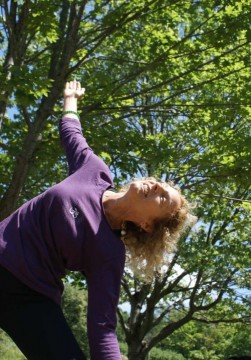 As we move into a season of diminishing light, those who are prone to seasonal affective disorder (SAD), up their intake of vitamin D, plug in the light box, and if they can afford the trip, begin making plans for a winter vacation in the sun. Yoga offers us a powerful antidote to winter blues. Inversions are great. Even if you cannot do headstand, there are many poses that place the head beneath the heart. Standing forward bends like Standing Yoga Mudra, are excellent. And poses done in a high kneeling position, like seated Yoga Mudra and Rabbit, are also great for bringing the good biochemistry you’ve awakened with your practice to your brain. While doing any of these forward bending – head beneath heart poses, use the tone, “NG” with the tip of your tongue at the dome of the hard pallet. You will feel the vibratory effect that is likely stimulating pineal and pituitary glandes and may aid in the production of Vitamin D. Researchers have not yet investigated these practices, but anecdotal evidence suggests that inversions with this mantra are helping people experience fewer SAD symptoms.
As we move into a season of diminishing light, those who are prone to seasonal affective disorder (SAD), up their intake of vitamin D, plug in the light box, and if they can afford the trip, begin making plans for a winter vacation in the sun. Yoga offers us a powerful antidote to winter blues. Inversions are great. Even if you cannot do headstand, there are many poses that place the head beneath the heart. Standing forward bends like Standing Yoga Mudra, are excellent. And poses done in a high kneeling position, like seated Yoga Mudra and Rabbit, are also great for bringing the good biochemistry you’ve awakened with your practice to your brain. While doing any of these forward bending – head beneath heart poses, use the tone, “NG” with the tip of your tongue at the dome of the hard pallet. You will feel the vibratory effect that is likely stimulating pineal and pituitary glandes and may aid in the production of Vitamin D. Researchers have not yet investigated these practices, but anecdotal evidence suggests that inversions with this mantra are helping people experience fewer SAD symptoms.
If you are a yoga or health professional, prone to SAD, consider taking the LifeForce Yoga Practitioner Training in Tucson in January. Or, come to The Bahamas in February for a dose of sunlight. You don’t need to be a professional, to take our Module A LFYP Training at that location.
Below, we have research on Yoga and bipolar disorder from Brown University and Butler Hospital and new research showing yoga helped female patients with Multiple Sclerosis improve their mental and physical health.
Read reviews by me of Shema Meditation through the Chakras DVD by Robin Rothenberg, Kabalah Yoga: Awaken Your Soul and Kabalah Yoga: Mystic Flow 2 Practice DVDs by Audi Gozlan, Ph.D., and Awakening: Aspiration to Realization Through Integral Yoga a book by Swami Karunananda.
Debbie Lubetkin, PsyD, LFYP-2 reviews Freud and Yoga, Two Philosophies of the Mind Compared by D.K.V. Desikachar and Helfried Krusche.
Rose Kress, RYT-500, LFYP-2 reviews Survivors on the Yoga Mat: Stories for Those Healing from Trauma by Becky Thompson.
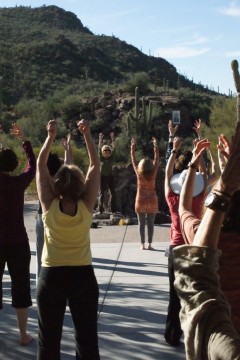 Research: Yoga and Bipolar Disorder
Research: Yoga and Bipolar Disorder
The research team, headed by Lisa Uebelacker of Brown University and Butler Hospital that is wrapping up a major National Institute of Health funded study on depression, has just published survey data in the Journal of Psychiatric Practice that indicates yoga practice has substantially helped the majority of respondents with managing their bipolar disorder (BD). This is significant, because although there have been numerous case reports of both benefits and abreactions from people with BD, this is the first report that has surveyed a large group of yoga practitioners with bipolar disorder.
When asked, “What impact do you think yoga has on your life?” the vast majority of on-line survey responses were positive and about one in five respondents characterized yoga as “life changing.” One even said, “Yoga has saved my life. … I might not be alive today were it not for yoga.” More than 70 people with a bipolar disorder diagnosis responded. Many respondents said yoga decreased anxiety and promoted calm or provided other emotional benefits. Calm also emerged as a specific benefit for 23 survey respondents when asked how yoga affects mania symptoms. Other benefits that were mentioned repeatedly included distraction from depressive thoughts and increased clarity of thought.
On the cautionary side, five of the 70 respondents became too agitated after rapid breathing, and one depressed individual became even more depressed after a practice that was too slow and meditative.
These kind of responses are important to note, because they highlight the importance for practitioners of understanding the principles and practices involved in meeting the mood, be it overly stimulated anxious or manic (rajasic) or deeply lethargic, depressed (tamasic) and then reestablishing balance. It is vital that both yoga professionals and mental health professionals who are integrating simple yoga practices like pranayama breathing or mantra tones or hand gestures called mudras, understand the effects and contraindications of these practices for people with bipolar disorder. This is precisely why specialty yoga training programs that include an understanding of mental health are important for those serving people in recovery, with mood disorders, or with a history of trauma. It is why I founded and continue to lead the LifeForce Yoga Practitioner Training with a faculty of highly skilled yoga and mental health professionals.
I am honored to have been a consultant on the forthcoming Brown/Butler study on unipolar depression, in which a few LifeForce Yoga practices were included. Read the full article on the bipolar depression survey here.
 Research: Yoga and MS
Research: Yoga and MS
In a study conducted by Rutgers University researchers and recently published in The Journal of Alternative and Complementary Medicine, Yoga helped improve physical and mental health in a small population of women moderately disabled due to a diagnosis of multiple sclerosis (MS). Fourteen women with a diagnosis of MS, ages 34 to 64, attended a yoga class designed by health care professionals with yoga training in consultation with people with MS who have taken yoga. The study subjects attended two 1.5 hour classes a week for two months and were encouraged to practice at home. The classes included yoga philosophy, breathing, postures, relaxation, meditation, tracked home practice, and assessments at 0, 9, and 16 weeks.
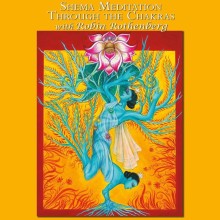 Review: Shema Meditation through the Chakras
Review: Shema Meditation through the Chakras
By Robin Rothenberg
Internationally known yoga therapist and trainer Robin Rothenberg’s Shema Meditation through the Chakras, is simply produced and led in her home studio.. Through most of this DVD, Robin speaks to us from her embrace of therapeutic yoga and her personal understanding of Judaism as a contemporary student of Torah. While the production values of this video are basic, her passionate intention to share the symbolism and resonance of each energy center with the essence of the six Hebrew words of the Shema creates a foundation for a safe and basic brief physical practice and a meditation, accompanied by award-winning composer Nancy Rumbel’s lyrical soundscape.
To purchase a copy click here.
 Review: Survivors on the Yoga Mat: Stories for Those Healing from Trauma
Review: Survivors on the Yoga Mat: Stories for Those Healing from Trauma
By Becky Thompson
Reviewed by Rose Kress ERYT-500, LFYP-2, LFYE, LifeForce Yoga Education Director
In Survivors on the Yoga Mat, author Becky Thompson weaves poetry, research, personal anecdotes, and accounts from others to detail the ways in which trauma survivors experience and approach yoga. Rather than write a lengthy book, Thompson uses short stories or vignettes to tell the story of survivors on the mat. It is easy to breeze through this book with chapters that are one to three pages in length. The shortness of each account or story does not limit the impact. Rather, the impact of each vignette is supported by it shortness; it gives the reader ample time to digest and ponder each story.
Thompson arranges her book into six sections. Each part of the book covers a different aspect of the experience of trauma on the yoga mat. From drug addiction, to an exercise regime, the first section, “Deeper than Words,” shares the stories of what brings a trauma survivor to the yoga mat. Many of the stories detail the difficulties one encounters when first stepping on the Yoga path. For the first couple of years, many people share the common experience of trouble stilling the mind, difficulty in relaxing, desire to please the teacher, etc. Thompson shares her story of thinking up excuses to leave class early because it was uncomfortable to relax or even close her eyes at the end of class.
The other sections of the book illuminate the survivor’s journey through yoga and trauma recovery. In section two, there are vignettes about what makes trauma survivors distinctive and how their trauma shapes their practice and approach to yoga. Section three is aptly titled “Hide and Seek.” There are moments, shared in the chapter titled “The Possibility of ‘Eventually,’” where one woman experiences immediate relief. After surviving a genocide in Zimbabwe, the student had been unable to sleep through the night for years. But after one session, “she slept like a baby.” The immediate relief brings the practitioner back to the mat, but there are many times where the practice seems the same and no changes can be detected. Thompson points out that consistency is key and many survivors can feel uncomfortable as “predictability can feel like something is missing, an eerie quiet before a storm.” Thus, the practice becomes an act of faith; the immediate relief provides a glimpse of a future where the survivor will not need to run from the past.
Section four, “The Color of Rothko’s Blue,” shares stories of practicing yoga over the long-term. Thompson stresses the importance of self-reflection and how the practice opens trauma survivors to other creative activities. Section five, “In the Shadow of the Temple,” illuminates the special relationship between survivors and teachers – a two-way street, where each learns from the other. Finally, section six, “Love Calls Us to the Things of This World,” expands the practice off the mat. These stories share how yoga can and is fueling social justice and change in the world. As a result of daily practice, many are called to share the transformative power of yoga with the world.
Becky Thompson has written a beautiful guidebook through the experience of recovering from trauma on the yoga mat. Survivors will find support for their challenges and successes on the mat as well as a witness to their experience. Yoga teachers will find this book supportive in working with students and clients as it provides accounts of how survivors feel disconnected and uncomfortable in their bodies. Yoga teachers can use this insight to modify language while instructing and to create an atmosphere of permission.
Rose began practicing yoga more than 15 years ago and has been teaching since 2004. In that time she has focused on the therapeutic aspects of yoga – for the body, mind and soul. Rose teaches class and workshops throughout the Tucson area and has been blessed to teach classes at The Crossings in Austin, TX, at Kripalu in Lenox, MA and at the Flagstaff Yoga Festival and Bisbee Yoga Expo under the guidance of her teacher, Amy Weintraub. Rose has also studied with Rama Jyoti Vernon and has taken the Functional Yoga Therapy Training with Maria KaliMa. Rose is the Program Manager of the LifeForce Yoga Healing Institute and travels with Amy to assist her in LifeForce Yoga Practitioner Trainings. yoginirose.com
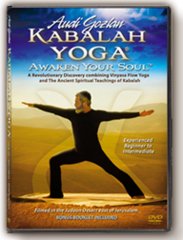 Review: Kabalah Yoga: Awaken Your Soul and Kabalah Yoga: Mystic Flow
Review: Kabalah Yoga: Awaken Your Soul and Kabalah Yoga: Mystic Flow
2 Practice DVDs by Audi Gozlan, Ph.D.
If you are a Vinyasa (flow) Yoga practitioner, no matter if you have a religious affiliation or not, you will find Canadian Audi Gozlan’s two videos astonishingly beautiful and an inspiring guidance for your flow yoga practice. Even if you don’t practice flow yoga, there is much to enliven and motivate your practice here.
In the first, Kabalah Yoga: Awaken Your Soul, Audi takes us on his own journey of discovery. He describes in the introduction how, as a student of Kabalah, when he began to practice yoga postures, he felt his own body taking the shape of the Hebrew letters. Audi is also a painter, and his artistic vision informs this gorgeous video, shot in the Judean Desert, east of Jerusalem. During the practice, after leading warm-ups and a flow of postures, Audi invites the viewer to choose your own personal word or phrase from the eleven he presents, and guides you to flow into that. Examples of Hebrew words/phrases that correlate with the Hebrew letters themselves and the yoga poses are Anochi—I am; Aish—fire; Adam Chad—in me there is one; and Chai—alive.
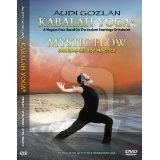 In Kabalah Yoga: Mystic Flow, stunningly captured in HD at the Mediterranean Sea in Israel, Audi Gozlan offers a Vinyasa (flow) practice that moves through the chakras—the energy centers within and beyond the body. In this practice, Audi aligns the chakras with the Kabalist concept of the Sefirot, the ten creative forces (bright light/sphere) that intervene between the infinite and our created world. On this DVD, there are nine pre-selected yoga flows, each of which is approximately 40 minutes long and begins with a meditation. As the meditation begins, we see a beautiful montage of Audi wrapping tefillin, the leather straps worn by religious Jewish men in morning prayer to remind them to “love the Lord your God with all your heart, with all your soul, and with all your might.” Within the DVD are many ways to customize your flow to align with your own energy, abilities and the chakras with which you are working. Audi’s guidance inspires an inward looking and contemplative posture practice. In his talk, he begins with the importance of breath awareness, and brings in the spiritual aspects of ruach and prana. He compares the 5 levels of existence and awareness in Kabalistic terms with the Sanskrit understanding of the koshas. He discusses the qualities of the soul and the need to polish the treasure of your soul to bring out the beauty from within. His discussion is graphically enlivened by beautiful animated imagery and subtitles.
In Kabalah Yoga: Mystic Flow, stunningly captured in HD at the Mediterranean Sea in Israel, Audi Gozlan offers a Vinyasa (flow) practice that moves through the chakras—the energy centers within and beyond the body. In this practice, Audi aligns the chakras with the Kabalist concept of the Sefirot, the ten creative forces (bright light/sphere) that intervene between the infinite and our created world. On this DVD, there are nine pre-selected yoga flows, each of which is approximately 40 minutes long and begins with a meditation. As the meditation begins, we see a beautiful montage of Audi wrapping tefillin, the leather straps worn by religious Jewish men in morning prayer to remind them to “love the Lord your God with all your heart, with all your soul, and with all your might.” Within the DVD are many ways to customize your flow to align with your own energy, abilities and the chakras with which you are working. Audi’s guidance inspires an inward looking and contemplative posture practice. In his talk, he begins with the importance of breath awareness, and brings in the spiritual aspects of ruach and prana. He compares the 5 levels of existence and awareness in Kabalistic terms with the Sanskrit understanding of the koshas. He discusses the qualities of the soul and the need to polish the treasure of your soul to bring out the beauty from within. His discussion is graphically enlivened by beautiful animated imagery and subtitles.
Whether you are interested in Kabalah or in Vinyasa Yoga, practicing with either or both of these illuminating DVDs, so passionately produced by an artist and scholar, can transform your yoga practice, physically and spiritually.
 Review: Awakening: Aspiration to Realization Through Integral Yoga
Review: Awakening: Aspiration to Realization Through Integral Yoga
By: Swami Karunananda
These days, yoga is all about therapeutics. It is often stripped of its esoteric elements, cleaned up to present to patients on hospital wards, clients in clinical settings, and people who wouldn’t be caught dead in a yoga studio. Not that this is a terrible thing. It really isn’t. What it means is that those people who would balk at the idea of practicing yoga can have access, through their health care provider or their minister or life coach, to ancient practices, some of which now have good research to prove their efficacy. Even yoga-phobes can learn practices that can help them back from the edges of imbalance to a place of healing, of balance, of homeostasis, of wholeness. Health insurance companies are beginning to study yoga, because they see the cost of treating diabetes or heart disease or depression plummets with the addition of yoga therapy. And with the medicalization of yoga, the patients themselves never have to know that what has helped them is actually an ancient practice, once passed from master to student for thousands of years.
The planet needs these healing practices. Individual people need these healing practices. If taking the Eastern philosophical references out of their presentation to a Western audience touches more peoples’ lives, then let’s do that.—“If they won’t drink the Kool-Aid,” I heard the beloved adaptive yoga teacher trainer and author of the magnificent memoir Waking, Matthew Sanford say, “water it down.” Yes. I and other yoga therapists have learned to make practices accessible to Westerners who will not, would not practice yoga. But, and this is a huge “but.” We cannot let the origins of these practices, processes and their philosophical foundation fade out of the consciousness of those who wish to delve deeper. To adapt and modify for a psychiatric population or a specialized group—whether it be those in recovery from addictions or with a chronic or degenerative illness—we, as yoga professionals need to remain inspired. We need to go back to the fountain to drink from the well of our teachers and our teachers’ teachers.
And so enter this beautiful book by Swami Karunananda, a disciple of Sri Swami Satchidananda, the founder of Integral Yoga. Within its pages we have personal stories and the transmission of her keen understanding of her Guru’s teachings. It is a book to return to, over and over again, to be inspired by, to quote from, to read on your mat and to keep by your bedside. It’s a testament to the power of relationship to heal.
In offering the reader the wisdom of yoga, Swami Karunananda stands on the foundation of Patanjali’s Yoga Sutras as illuminated by her teacher. For example, after discussing Patanjali’s assurance that one practice, mantra japa (repetition), can ease a range of physical, mental and spiritual obstacles, which she discusses from both ancient philosophical and current scientific understanding, she says, “Just like we use sound vibrations to clean items like jewels, teeth or even kidney stones, mantras clean our entire system—physical and mental.” Later, she simplifies what Swami Satchidananda has taught her. “A mantra is like soap; it cleanses the body and mind. It is like fire; it burns all the impurities. Repetition of the mantra will make the mind strong, clear and collected.”
There is so much richness in this book. Whether the author is talking about meditation, self-inquiry, repeating the stories of her own Guru, her own failures and triumphs, or the laws of karma, there is great wisdom within these pages to keep a seeker on her path.
To order a copy of Awakening: Aspiration to Realization Through Integral Yoga click here.
 Review: Freud and Yoga, Two Philosophies of the Mind Compared
Review: Freud and Yoga, Two Philosophies of the Mind Compared
By D.K.V. Desikachar and Helfried Krusche
Reviewed by Deborah Lubetkin, Psy.D., RYT-200, LFY Mentor
In this dyadic interchange between the renowned yoga master D.K.V. Desikachar and German Psychoanalyst Helfried Krusche, the parallels between the yoga student-teacher relationship and the analyst–analysand relationship are visited throughout an in-depth interview. Dr. Krusche is also a trained yoga instructor, and frequent lecturer on the topic of Yoga & Psychoanalysis. Both Desikachar and Krusche begin this journey with the idea that both models “come to life through dialogue.” Throughout the interview, Desikachar leads the reader through an approach to understanding the mind based on principles from Patanjali’s Yoga Sutras. Kruche’s perspective is rooted in the model of classical psychoanalysis. A psychoanalytic perspective is one that explores the psyche based on each individual’s relationship between self and inner and outer world.
Though each perspective has clear cultural and philosophical differences, the authors’ intention is to draw profound parallels between these two relationships. Because the relationship between analyst and analysand and the classical yoga master/student relationship are vertical with a clear hierarchy, Desikachar and Kruche emphasize throughout this dialogue that the analyst and the yoga master must take great care to be sure that the commitment to the patient/student supersedes the teacher’s goals or ego. Ideally, the single-pointed focus of the yoga teacher on the student’s growth allows the student to learn fully from the feelings and thoughts that arise during the process, much like in psychotherapy where the analyst creates a “blank slate” for the patient to bring forth all thoughts and emotions essential for healing. Both relationships rely on the safety, commitment, and consistency in the relationship. This emphasis on relationship was intriguing, making this a book that provokes deeper self-inquiry and exploration. As a reader who is both a psychologist and yoga teacher, this is what I most enjoyed. At times, the search for a parallel process or experience in psychoanalysis to “match” a sutra seemed forced. Yet the reader feels the authors’ passion and joy throughout their dialogue.
For LifeForce Yoga Practitioners or anyone integrating the complementary processes of yoga and psychotherapy, this is a thoughtful and thought-provoking read, click here to purchase a copy.
Deborah E. Lubetkin, Psy.D. is a Licensed Psychologist in Montclair, NJ. She is also a Kripalu Yoga teacher (RYT-200), and a Certified LifeForce Yoga ® Practitioner and mentor. Deborah’s work integrates psychotherapy with LifeForce Yoga and Eastern Philosophy.
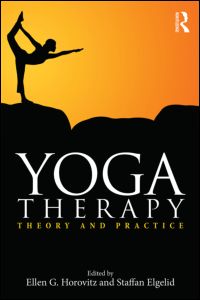 News: Special promotion code for forthcoming book Yoga Therapy
News: Special promotion code for forthcoming book Yoga Therapy
Pre-order a copy of Yoga Therapy, the forthcoming book, edited by Ellen Horowitz Ph.D. , LFYP, which features a chapter about yoga and mental health written by Amy Weintraub. 20% discount for LifeForce Yoga subscribers using code IRK71.